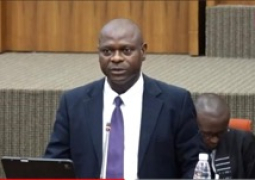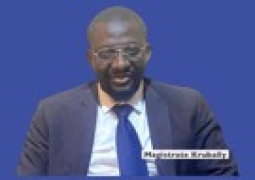
Minister Juwara made the remarks yesterday, Tuesday, at the Sir Dawda Kairaba Jawara International Conference Centre during the consultative study workshop on the National Water and Electricity Company (NAWEC) water and power separation.
The Millennium Challenge Account – Gambia (MCA-G) with support from the Millennium Challenge Corporation (MCC) is implementing a US$25 million Threshold Programme which aims to enhance the governance and operations of the power sector by instituting reform that drives accountability and transparency.
The focus of discussion at the gathering constituted one of the predetermined activities financed by the MCC Threshold Programme, which seeks to address the challenges of unreliable and inadequate supply of electricity in The Gambia. The programme is designed to complement the investments in the energy sector that the government of The Gambia has undertaken with support from other development partners such as World Bank and European Union.
Through the World Bank support to the energy sector, some progress has been realised including the separation of accounts for NAWEC's business units. However, the move for the legal separation of core services is yet to be initiated despite government's commitment under the outdated energy policy. Through MCC Threshold intervention, the government requested for the NAWEC separation study among several other activities being implemented by GFA Consulting Group - the Power sector Threshold Service Contractor.
The study is intended to examine the costs and benefits of different options of lead separation aimed at assisting the Government in making an informed decision.
Mr Juwara explained that the study offers an answer to the long question of what is the optimal institutional structure for a modern utility to meet the aspirations of the public.
He pointed out that the outcome of the workshop would aid the government of The Gambia in making an evidence based decision in forging a sustainable path for the supply of clean, reliable and affordable electricity and water services for all Gambians.
“With a robust power sector, we can unlock a brighter future for our national development. NAWEC water and electricity separation is a priority for the government,” he stated.
According to him, guided by the drive for improvement in operational efficiency and leveling the playing field to encourage private sector participation in the power sector, the government of The Gambia intends to decouple the water and electricity businesses of NAWEC, noting that it is envisaged that the separation will lead to improved service delivery, increase focus on water services, increase investment in both service infrastructure and reduce the financial burden on the national budget.
Saffie Dambelleh, chief executive officer for the Millennium Challenge Account – Gambia (MCA-G), said that the consultation study calls for the need to acknowledge the fact that every reform comes with its challenges and it is therefore imperative to reflect on the nature of the utility as an indispensable service provider to all Gambians.
“Thus, all options for the separation must be assessed critically and thoroughly to aid in reaching decisions that will serve the interest of Gambians for better quality of life. Additionally, the management of the separation process of the two critical services of the utility must take into account the need for business continuity,” he highlighted.




